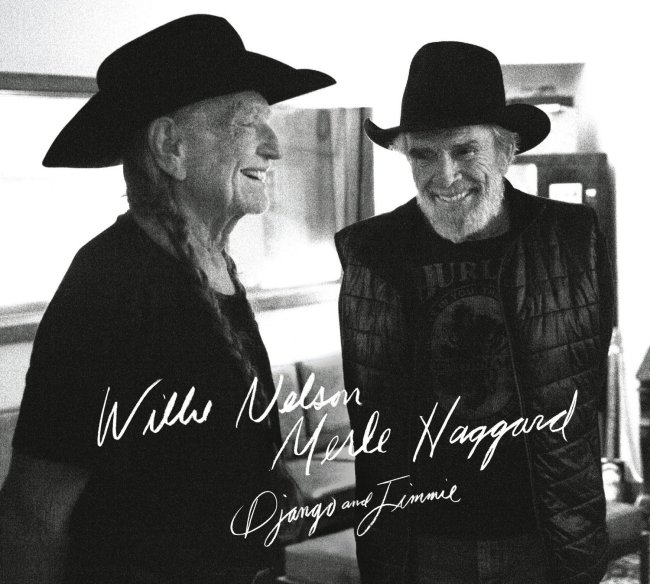Eyelike: Willie Nelson and Merle Haggard, Gloriana, The Mike + Ruthy Band
By Won Ho-jungPublished : June 5, 2015 - 21:28
Nelson, Haggard uninspired on 4th collaborative disc

Willie Nelson and Merle Haggard
“Django and Jimmie”
(Sony Legacy)
The two grand old men of country music, Willie Nelson and Merle Haggard, are among the last living ties to an era when giants like Ernest Tubb and Bob Wills filled honky tonks. Nelson is 82 and Haggard is 78, and while their warm voices show some mileage, their range of expression remains remarkable, and their phrasing often is impeccable.
On their fourth album together, “Django and Jimmie,” the feisty fellows lean on shuffling novelties and lighthearted swing, such as the title song, a tip of the cowboy hat to French guitarist Django Reinhardt and country blues pioneer Jimmie Rodgers.
“It‘s All Going to Pot” playfully engages Nelson’s appetite for marijuana, and ranks as the album’s most memorable original. The two cherry-pick a few songs from their monumental catalogs, covering Nelson’s “Family Bible” and Hag’s “Swinging Doors” and “Somewhere Between,” like friends passing the guitar at home.
Most of the originals -- “Unfair Weather Friend,” “Live This Long” -- don’t measure up to their classics, and the project would have benefited from better material. Hearing the old friends share lines on Bob Dylan‘s “Don’t Think Twice, It‘s Alright” indicates just how good “Django and Jimmie” could have been, if the two had approached the project with loftier ambitions. (AP)
Country trio Gloriana lacks heart, emotion on album

Gloriana
“Three”
(Emblem/Warner Bros.)
Despite plenty of vocal talent, Gloriana has struggled to establish an identity in the ultra-competitive country radio world. The trio’s third album once again shows off sterling harmonies and crafty arrangements -- but leaves little emotional substance for fans to connect with.
The problem may be the production of pop mastermind Matt Serletic, who has guided the band from the beginning. His busy arrangements, while clever, leave little room for the singers -- brothers Mike and Tom Gossin and Rachel Reinert -- to convey much warmth or personality. The result is an overly processed sound focused on lightweight material about relationships.
“Three” is the first album since the departure of founding member Cheyenne Kimball, and Reinert steps up and takes more lead vocals -- one of the album‘s strengths. Impressive moments surface in spots: The opening of “Are You Ready” slips nicely from a timeless choral arrangement into attention-getting modern vocal and electronic affects. Also, the intro to “Trouble,” with its banjo-mandolin rusticity, compellingly sets up the dark tone of Reinert’s voice as she confronts a wayward lover.
Gloriana continue to show potential. Now they need to show more heart -- an element too often missing from “Three.” (AP)
Mike + Ruthy Band serve up musical melting pot

The Mike + Ruthy Band
“Bright As You Can”
(Thirty Tigers)
On “Bright As You Can,” the husband-and-wife duo The Mike + Ruthy Band sing that their heroes are all on the other side, and it’s true the album draw on sources a Smithsonian Folkways archivist would recognize.
But the Woodstock, New York, couple’s broad, colorful palette of Americana is timeless. Their musical melting pot combines country twang, Cajun chug, R&B swing and gospel fervor, and the result is distinctive material like the banjo funk of “Golden Eye.”
Such ambitious reach could have made for a disaster, but everything is masterfully performed as Mike Merenda and Ruthy Ungar sing about the charms of hard work, homemade wine and free parking. Amid the barn dance reverie created by fiddle, pedal steel, horns and more, Ruthy‘s versatile alto is the most glorious instrument of all.
Not all of Mike and Ruthy’s musical influences are dead. “What Are We Waiting For” echoes Arcade Fire with an irresistible wordless singalong chorus, and “Goin’ Out” features a brass arrangement Tom Waits would love.
The album’s centerpiece does reference the hereafter, however, and for fans of the ’60s prone to sentimentality, “The Ghost of Richard Manuel” will bring tears of age. (AP)



![[Exclusive] Korean military set to ban iPhones over 'security' concerns](http://res.heraldm.com/phpwas/restmb_idxmake.php?idx=644&simg=/content/image/2024/04/23/20240423050599_0.jpg&u=20240423183955)

![[Graphic News] 77% of young Koreans still financially dependent](http://res.heraldm.com/phpwas/restmb_idxmake.php?idx=644&simg=/content/image/2024/04/22/20240422050762_0.gif&u=)



![[Pressure points] Leggings in public: Fashion statement or social faux pas?](http://res.heraldm.com/phpwas/restmb_idxmake.php?idx=644&simg=/content/image/2024/04/23/20240423050669_0.jpg&u=)









